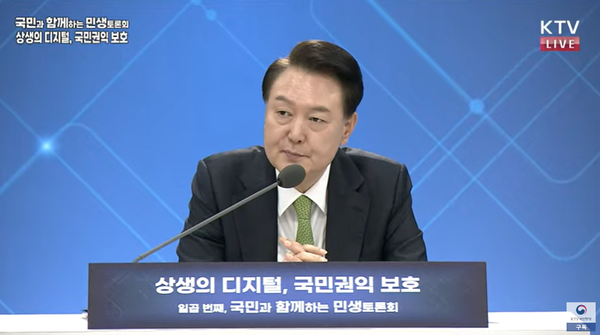President Yoon Suk Yeol said non-face-to-face medical treatment should be viewed from the perspective of developing the bio-medical industry, emphasizing that the government would pursue policies to attain administrative goals by fostering related industries rather than regulating them.

President Yoon made the remarks at a policy debate meeting with the public on the theme of "Digital for Win-Win and Protecting People's Rights and Interests" on Tuesday.
The Public Livelihood Debate with the People is a series of town hall meetings where the government discusses various policies it promotes with people from various walks of life on several topics, replacing the previous administrative reports from government agencies in the New Year.
As such, the topics and remarks made by the president are interpreted as indicative of the government's future policy direction.
The healthcare policies discussed at the debate included reinvigorating non-face-to-face medical treatment and utilizing personalized health information.
"During the Covid-19 pandemic, the people and physicians wisely used non-face-to-face medical care, and a new private market is being created by revitalizing digital medical services," President Yoon said in his opening speech,
After the pandemic, however, it was not institutionalized, leading to limited implementation, as shown by failures in the drug delivery system, resulting in public inconvenience and criticism about going backward, Yoon pointed out.
Non-face-to-face medical treatment in Korea began in February 2020 when the Covid-19 pandemic crisis level was raised to "severe," and phone consultations and prescriptions were allowed for a limited time. It did not end when the Covid-19 crisis stage was downgraded again but has continued as a pilot project since June 2023. The National Assembly is discussing amending the Medical Service Act to institutionalize it.
The president's remarks were followed by comments from private participants, including a working mom raising a five-year-old child and Kim Seong-hyun, director of the Korea Digital Health Industry Association, spoke respectively.
"As a working mom, I use a lot of non-face-to-face medical treatment. I regret that I would like to use non-face-to-face treatment at the pediatric departments I usually use, but there are still few implementing hospitals and pharmacies," she said. "I hope (the president) will continue to pay attention to non-face-to-face treatment so that parents can work comfortably and without watching employers' faces when their children are sick."
Director Kim said, "The digital innovation experience in overcoming Covid-19 has changed our lives more than we could have imagined. We need institutional support to enjoy this change stably and without side effects. The pace of regulatory reform is not keeping up with the changes worldwide."
Kim noted that non-face-to-face medical treatment is filling the institutional gap with pilot projects due to the failure to revise the Medical Service Act, adding that it is necessary to introduce a system (of non-face-to-face medical treatment) for national healthcare.
In his concluding remarks, President Yoon called for the industrialization of non-face-to-face care, stressing that it should be viewed from the perspective of developing Korea's biomedical industry.
"We are approaching non-face-to-face care as a conflict of interest between the medical community and healthcare consumers, but I think it should be viewed as a problem for the development of Korea's bio-medical industry," President Yoon said. "Non-face-to-face care should be approached from the perspective of creating benefits for the people and the country."
The chief executive added that the government should not regulate the other side to ensure the rights and interests of this side, stressing that it is important to foster related industries to fulfill administrative purposes.
"Our country’s medical technology is remarkable. It can open up overseas markets to the world. There should be innovation so that our doctors can enter more overseas markets and digitalization, including non-face-to-face care, can become globally competitive for the development of the medical industry. The government will push policies in this direction."
Related articles
- Telemedicine legislation stalls due to excessive detail in revision bills
- ‘Industry welcomes telemedicine pilot project but faces lots of homework’
- [Top 10 Healthcare News in 2023 ⑤] Telemedicine pilot project starts without law amendment
- Government's telemedicine plan to replace doctors met with skepticism from industry
- Hair loss, acne prescriptions dominate telemedicine landscape
- Government fills medical void by allowing telemedicine for public health centers

